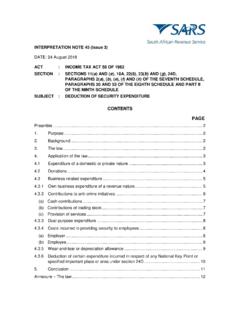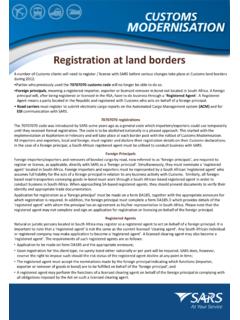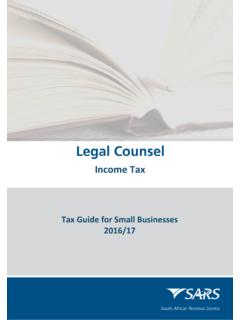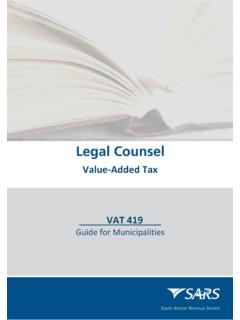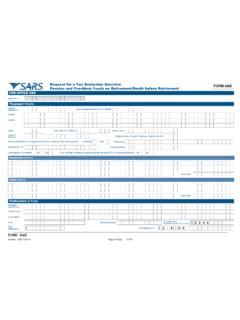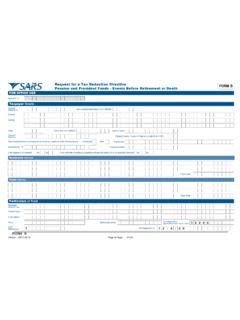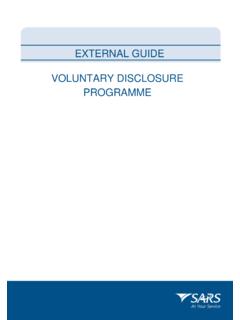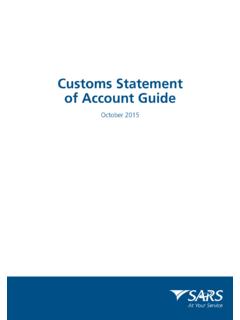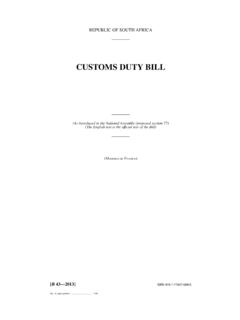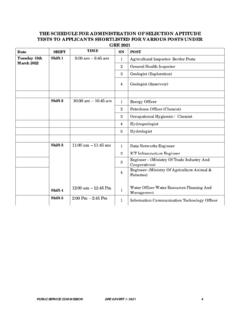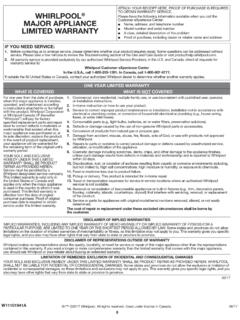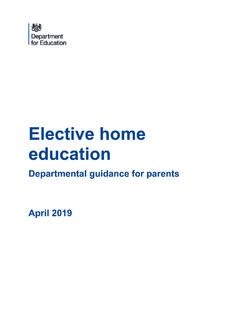Transcription of INTERPRETATION NOTE 66 SECTION : SECTION 10(1)(q) AND …
1 INTERPRETATION NOTE 66 DATE: 01 March 2012 ACT : INCOME TAX ACT NO. 58 OF 1962 (the Act) SECTION : SECTION 10(1)(q) AND THE SEVENTH SCHEDULE TO THE ACT SUBJECT : SCHOLARSHIPS OR BURSARIES Preamble In this Note references to sections are to sections of the Act; references to paragraphs are to paragraphs of the Seventh Schedule to the Act unless otherwise stated; and unless the context indicates otherwise, any word or expression bears the meaning ascribed to it in the Act. 1. Purpose This Note provides clarity on the tax implications of any bona fide scholarship or bursary granted to enable or assist any person to study at a recognised educational or research institution. Practice Note No. 17 of 12 March 1993 is hereby withdrawn. 2. Background Generally, any bona fide scholarship or bursary granted to enable or assist any person to study at a recognised educational or research institution is exempt from normal tax.
2 This exemption is, however, subject to certain conditions, particularly where the scholarship or bursary is granted by an employer (or an associated institution in relation to that employer) to an employee or to a relative of such employee. 3. The law For ease of reference, the relevant sections of the Act are quoted in Annexure A, and are discussed in more detail below. 4. INTERPRETATION of words and phrases Bona fide scholarship or bursary granted The phrase bona fide scholarship or bursary granted refers to financial or similar assistance granted to enable a person to study at a recognised educational or research institution. Such financial aid may be awarded with or without taking into account academic merit, and would include a grant which is, in terms of a written agreement, conditional upon the fulfilment of certain stipulated requirements.
3 The 2 grantee may, for example, be required to obtain a qualification within a certain period, or take up employment with the grantor on completion of the course of study. The grant must be made to enable the grantee to pursue a course of study for the purpose of gaining or expanding knowledge, aptitude or skills. A reward or reimbursement of study expenses, borne by a person, after completion of studies, does not qualify for the exemption, as the grant must have been made solely to enable or assist the grantee to study. The tax position relative to scholarships, bursaries and study loans is dealt with in 5 of this Note. A bona fide scholarship or bursary could include the cost of the following: Tuition fees Registration fees Examination fees Books Equipment (required in that particular field of study, for example, financial or scientific calculators) Accommodation (other than the person s home) Meals or meal voucher/card Transport (from residence to campus and vice versa).
4 A direct payment of fees, for example, to a university for the purpose of an employee s studies, is regarded as falling within the ambit of a bona fide scholarship or bursary. Recognised educational or research institution The scholarship or bursary must be granted to study at a recognised educational or research institution . SARS will accept that an educational or research institution qualifies as recognised if that institution has been established by or registered under the laws of South Africa, for example the Higher Education Act, 1997, the Skills Development Act, 1998 or the National Research Foundation Act, 1998. It will also be acceptable if a scholarship or bursary is granted to study at a foreign educational or research institution if the qualification obtained from that institution upon completion of such studies would be recognised by the South African Qualifications Authority under the National Qualifications Framework Act, 2008.
5 In cases where the educational or research institution does not fall into one of the above categories, the local SARS office should be approached for confirmation whether or not the institution qualifies. To study The words to study refer to the formal process whereby the person to whom the scholarship or bursary has been granted gains or enhances his or her knowledge, aptitude or expertise in the pursuit of learning. It is not a requirement that a degree, diploma or certificate be attained on completion of the course of study. 3 Research undertaken by a person for the benefit of another person, for example, an employer, a business or sponsor, is not regarded as studies . Funding of such research will not constitute a bona fide scholarship or bursary granted to enable or assist the researcher to study.
6 See 5 below for the tax implications in this regard. A grant to a visiting academic for the purpose of lecturing students does not satisfy the study requirement, as the object of the grant will be to impart and not to gain knowledge. Remuneration The word remuneration refers to the amounts payable by the employer to an employee for services rendered or by virtue of employment. For example, where an employer has granted a travelling allowance to the employee, the full amount of the allowance will be taken into account to determine if the remuneration derived by the employee during the year of assessment exceeded R100 000, as referred to in SECTION 10(1)(q)(ii)(aa). It is clear, therefore, that the meaning of remuneration in this regard is not remuneration as defined in paragraph 1 of the Fourth Schedule to the Act.
7 Fund The word fund is not defined in the Act and must therefore be given its ordinary meaning. The Oxford Dictionary & Thesaurus1 defines the word fund to mean a stock of money, esp. one set apart for a purpose . The Concise Oxford English Dictionary2It is evident from the above dictionary definitions that the meaning of the word fund in sub-paragraph (c) of the definition of associated institution is very wide. As soon as a sum of money is set aside for a particular purpose (for example, to grant scholarships or bursaries), the said sum of money is a fund and is, in itself, classed as an associated institution in relation to the employer if it is solely or mainly established to provide benefits to employees or former employees of a particular employer.
8 Defines fund as a sum of money saved or made available for a particular purpose . Example 1 A fund Facts: Company A set aside R1 million for various corporate responsibilities. R350 000 was set aside for corporate social responsibility, R200 000 for providing bursaries, and R450 000 for research and development. How will the R1 million be viewed for tax purposes? Result: Each of the allocated amounts is to be regarded as a fund on its own. 1 The Oxford Dictionary & Thesaurus, first published by Oxford University Press, 1993 as The Readers Digest Oxford Wordfinder. 2 Concise Oxford English Dictionary edited by Catherine Soanes, Angus New York; Oxford University Press, 2006. 4 5.
9 Application of the law Exemption Generally, bona fide scholarships or bursaries are fully exempt from normal tax, provided they are awarded solely on merit to any applicant and are not to any extent confined solely to employees or relatives of employees of a particular employer; the scholarship or bursary is awarded to enable the scholarship-holder to study at a recognised educational or research institution; and certain conditions are met. Conditions The exemption of a scholarship or bursary granted by the employer (or by an associated institution in relation to the employer) to the employee or to a relative of such employee is subject to the following conditions: a) A scholarship or bursary awarded to the employee is not exempt from normal tax in the hands of the employee unless he or she agrees to reimburse his or her employer for the scholarship or bursary if he or she fails to complete his or her studies for reasons other than death, ill-health or injury.
10 See SECTION 10(1)(q)(i). The Explanatory Memorandum on the Revenue Laws Amendment Bill, 2006, explains that bursaries granted to employees are exempt from tax ..as long as the employee agrees to repay the employer if the employee fails to fulfil his or her scholarship or bursary This repayment clause provides an incentive for employees to take their scholarship or bursary commitments seriously. The obligation of an employee to complete his or her studies therefore refers to the study obligations imposed on the employee under the scholarship or bursary. A scholarship or bursary will not qualify for the exemption if there is no repayment clause in the agreement with the employer. Example 2 Conditional scholarship or bursary Facts: Z and J are each awarded a bursary from their employer, ABC (Pty) Ltd, to study at a recognised university.
